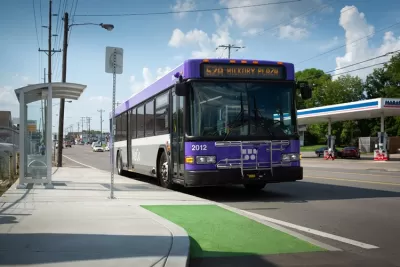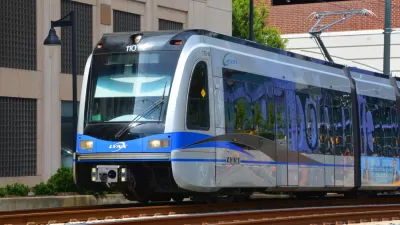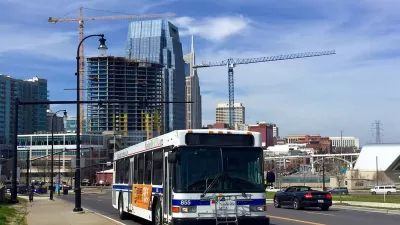The plan will hinge on voter approval of a half-cent sales tax increase on the November ballot.

Nashville Mayor Freddie O’Connell announced a $3.1 billion dollar plan to expand transit in the city. The proposed initiative, called “Choose How You Move,” would be paid for with a half-cent sales tax increase that will appear on the ballot in November, reports Cassandra Stephenson for the Nashville Tennessean.
The majority of the proposed improvements (nearly 60 percent) would come in the form of expanded and enhanced bus service. According to Stephenson, the local WeGo bus service would nearly double under the plan, including the creation of four new express bus routes, as well as updated routes and increased frequency throughout the city. The rest of the plan will add sidewalks, upgrade and add traffic signals, and build new transit centers, as well as create a microtransit pilot and purchase 26 acres of land adjacent to transit center locations to use for things like housing and parks.
The proposed plan comes almost six years after Nashville voters firmly rejected a referendum for a $5.4 billion transit plan and a rebranding of Nashville MTA as WeGo. If voters approve the ballot measure in November, the plan will cost the average Nashville family about $70 more per year in sales tax and take 15 years to complete. The tax increase will cover around 40 percent of the plan’s total cost, writes Stephenson, with the remainder coming from fares, bonds, and state and federal programs. Mayor O’Connell said at a press conference that having a dedicated source of transit funding will make Nashville more competitive for federal grants.
FULL STORY: Nashville's $3.1B transit plan: What's in it and how much it will cost taxpayers

Alabama: Trump Terminates Settlements for Black Communities Harmed By Raw Sewage
Trump deemed the landmark civil rights agreement “illegal DEI and environmental justice policy.”

Study: Maui’s Plan to Convert Vacation Rentals to Long-Term Housing Could Cause Nearly $1 Billion Economic Loss
The plan would reduce visitor accommodation by 25% resulting in 1,900 jobs lost.

Why Should We Subsidize Public Transportation?
Many public transit agencies face financial stress due to rising costs, declining fare revenue, and declining subsidies. Transit advocates must provide a strong business case for increasing public transit funding.

Paris Bike Boom Leads to Steep Drop in Air Pollution
The French city’s air quality has improved dramatically in the past 20 years, coinciding with a growth in cycling.

Why Housing Costs More to Build in California Than in Texas
Hard costs like labor and materials combined with ‘soft’ costs such as permitting make building in the San Francisco Bay Area almost three times as costly as in Texas cities.

San Diego County Sees a Rise in Urban Coyotes
San Diego County experiences a rise in urban coyotes, as sightings become prevalent throughout its urban neighbourhoods and surrounding areas.
Urban Design for Planners 1: Software Tools
This six-course series explores essential urban design concepts using open source software and equips planners with the tools they need to participate fully in the urban design process.
Planning for Universal Design
Learn the tools for implementing Universal Design in planning regulations.
Smith Gee Studio
Alamo Area Metropolitan Planning Organization
City of Santa Clarita
Institute for Housing and Urban Development Studies (IHS)
City of Grandview
Harvard GSD Executive Education
Toledo-Lucas County Plan Commissions
Salt Lake City
NYU Wagner Graduate School of Public Service





























